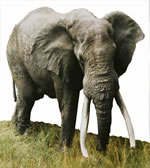Kambaku

Origin of Name: Kambaku is the Tsonga word for ‘Great Tusker’ or ‘Old Elephant Bull’.
Range: This bull moved over a huge tract of country stretching from Satara/Orpen and the Timbavati to Crocodile Bridge.
Special Features: Kambaku’s left ear had a perfectly round hole in it close to the outer edge, and towards the end of his life he had no tail hairs. He was also recognized by the prominent markings on his trunk, which had the appearance of a round patch of smooth skin.
General: Kambaku was the third member of the Magnificent Seven. He was commonly seen by the rangers of the Kingfisherspruit area and was photographed by many visitors to the Kruger National Park. Uniquely unlike several of the other Magnificent Seven bull, Kambaku was always seen alone.
He was more than 55-years-old when he was shot in late 1985 by Regional Ranger Lynn van Rooyen from the Lower Sabie Ranger Section. The bull was in obvious pain from a bullet wound suffered during a foray across the Crocodile River into a neighboring sugar cane fields. The bullet penetrated his left shoulder, leaving a large wound which eventually became septic. When he could not longer walk and it was clear that death was imminent, he was mercifully shot.
(Kambaku’s tusks are on display in the Letaba Elephant Hall)
|
Tusk Data |
Left |
Right |
|---|---|---|
|
Length (cm) |
259cm |
265cm |
|
Mass (kg) |
63.2kg |
64kg |
|
Circumference at Lip (cm) |
51cm |
52cm |
Source: https://www.sanparks.org/parks/kruger/elephants/tuskers/magnificent7.php
